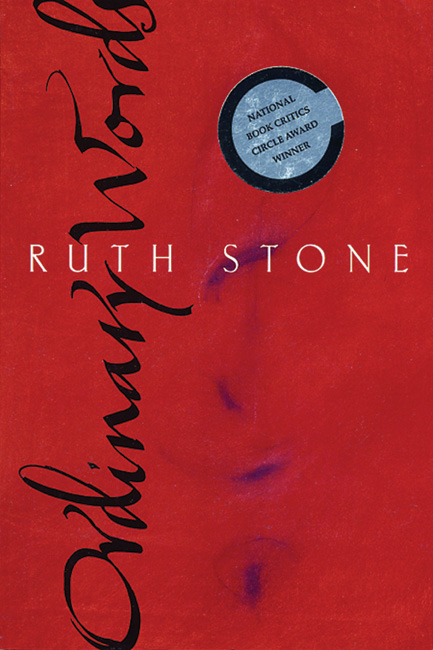Ruth Stone (1915-2011)
I have to admit that this morning I felt utterly exhausted. I seemed to be suffering from a complete lack of forward momentum and was just about to commit to taking a day off from my #nationalpoetrymonth blog marathon, when I opened my email and found this:
I was thinking about how I think of my life as stories, which tripped me to think about short stories, which caused me to wonder about how a poem is like a short story….I went to your blog and right off the bat, found two great examples of poems that are short stories. Gary Copeland Lilley and Jeanne Lohmann gave me a knock on the side of the head.
It made me want to join the conversation again.
I have been reading—sometimes memorizing—Ruth Stone’s poems ever since I came across her early poem,  “Orchard” in a small Modern Library anthology with a blue cover: Twentieth Century American Poetry. Published by Random House in 1944, and again in 1963, that “Twentieth-Century” seems poorly chosen, or at least arbitrary. I mean, why did the editors decide to include Emily Dickinson? Perhaps because she was published in the 20th century? But in 1944, we still had half a century to survive and write about!
“Orchard” in a small Modern Library anthology with a blue cover: Twentieth Century American Poetry. Published by Random House in 1944, and again in 1963, that “Twentieth-Century” seems poorly chosen, or at least arbitrary. I mean, why did the editors decide to include Emily Dickinson? Perhaps because she was published in the 20th century? But in 1944, we still had half a century to survive and write about!
Since that time I have picked up numerous copies of Ruth Stone’s books (she had 12, during her life). And now, thanks to Copper Canyon Press, we have a new, Essential Ruth Stone. I paid for a ticket so I could attend their Zoom book launch last fall, and bought a copy of the book.
Please, please follow the link (in paragraph above) to Copper Canyon and listen to Ruth’s granddaughter, Bianca, read aloud “Pokeberries.” Worth the price of admission. (And is it too much to hope that one day I’ll have a granddaughter who writes poems?)
Speaking of reading poetry aloud, I once heard Dorianne Laux recite this poem aloud—this was during her keynote talk at Litfuse, in maybe 2015. I had read the poem before, probably more than once. Frankly, it had never really come alive for me. But when Dorianne Laux recited it! Years later, I can still hear Dorianne’s voice—and Ruth Stone’s words. It also strikes me as being a perfectly condensed short story. Addressed to her late husband (who committed suicide when their daughters were young), the poem pours a whole life into its lines:
Curtains
Putting up new curtains
other windows intrude.
As though it is that first winter in Cambridge
when you and I had just moved in.
Now cold borscht alone in a bare kitchen.What does it mean if I say this years later?
Listen, last night I am on a crying jag
with my landlord, Mr. Tempesta.
I sneaked in two cats.
He screams, “No pets! No pets!”
I become my aunt Virginia,
proud but weak in the head.
I remember Anna Magnani.
I throw a few books. I shout.
He wipes his eyes and opens his hands.
OK OK keep the dirty animals
but no nails in the walls.
We cry together.
I am so nervous, he says.I want to dig you up and say, look,
it’s like the time, remember,
when I ran into our living room naked
to get rid of that fire inspector.See what you miss by being dead?
—Ruth Stone
Forgive my pronunciation of Anna Magnani. I practiced it, and still didn’t get it right.



 I’m so grateful for those of you reading along with me this month (just the blogposts, or your own deep-dive into poetry to celebrate April), but even if I were simply shouting into the void, I’m glad I took on this project.
I’m so grateful for those of you reading along with me this month (just the blogposts, or your own deep-dive into poetry to celebrate April), but even if I were simply shouting into the void, I’m glad I took on this project. I’m exhausted. Six days in Orlando on our BIG family vacation — an average of about 94 degrees (plus humidity!) and 4 days of theme parks — and this mom is tapped out.
I’m exhausted. Six days in Orlando on our BIG family vacation — an average of about 94 degrees (plus humidity!) and 4 days of theme parks — and this mom is tapped out.